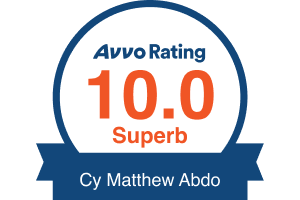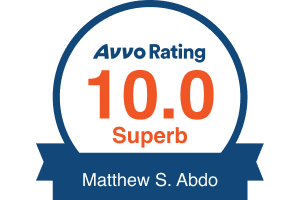Expungement
Expungement Under Michigan’s Clean Slate Law
Millions are Now Eligible for Expungement of Felonies and Misdemeanors!
Millions are now eligible for expungement of felonies and misdemeanors! Michigan has joined the movement to give individuals with an old criminal record a second chance. By adopting a clean slate law, more offenses can be expunged pursuant to formal proceedings and others may be subject to automatic expungement. ABDO LAW can handle your expungement in all Macomb County Courts including the Macomb Circuit Court, and all of the district courts located in Warren, Eastpointe, Roseville, St. Clair Shores, Sterling Heights, Clinton Township, New Baltimore, Shelby Township and Romeo. Put your Macomb County expungement in our hands and you will not need to worry about Michigan’s complicated expungement process.
Expungement Tools
The easiest way for us to discuss your eligibility for expungement is by email. Your initial consultation is FREE to determine your eligibility and your interest in retaining ABDO LAW. Our contact information is:
- Email: contact@abdolawfirm.com
- Phone: 586-412-5555
Contact by email: If you send an email with pertinent information, we will return a call or email with a response and a plan to proceed with your expungement. Please provide the following for an expungement evaluation:
- Your contact information
- Name (first, middle and last name)
- Prior name or maiden name at the time of your offense(s)
- Current address
- Cell phone and email address
- Conviction information for every lifetime criminal offense
- Offense information (felony, misdemeanor, specific name of offense such as retail fraud 3rd degree, assault with a deadly weapon)
- Date of sentence
- Date of sentence completion (completion of probation, parole)
- Place of offense (city and court where conviction occurred)
- Dismissed convictions after deferral or under advisement: You must disclose all prior criminal convictions, including convictions that have been dismissed after a deferral period, advisement period or delayed sentence under any provision of law including MCL 771.1, HYTA or MCL 333.7411.
- Copies of documents: Please provide copies of documents to expedite the expungement process by scanning documents and attaching to your email. The following documents may prove to be helpful: final dispositions, discharge(s) from probation, court notice with case information and case number, sentence orders.
Getting a Criminal Record
If you are not sure of your criminal history, you can order your criminal record from the Michigan State Police ICHAT website. This is an extremely useful site but it will not contain offenses that are sealed or that have been dismissed. The Michigan State Police website is a public search engine and does not show certain activity which the court and law enforcement agencies are able to access. Therefore, you may need to contact the specific court(s) for information about offenses that do not show up on the Michigan State Police ICHAT website.
Michigan Expungement Forms
The following are approved forms which are utilized for expungements in Michigan pursuant to Michigan’s Expungement statute (MCL 780.621):
Expungement Eligibility
A person can have criminal convictions expunged subject to the following limitations:
- Up to 3 felonies may be set aside which may include only 1 felony with a maximum penalty of more than 10 years in prison.
- If you have more than 3 felonies, you are not be eligible to have any of them set aside.
- Unlimited misdemeanors may be set aside.
- Maximum of 2 assaultive crimes in a person’s lifetime may be set aside.
- Only 1 felony for the same offense may be set aside if the maximum penalty for the offense is more than 10 years in prison.
- One Bad Night Rule: Multiple offenses are considered part of the same transaction if they occurred within 24 hours (does not include assaultive crimes, crimes involving use or possession of dangerous weapon or offenses punishable by 10 years or more.
- Each offense that has been dismissed under a special provision of law, deferral, MCL 333.7411, HYTA or MCL 771.1 count as a misdemeanor for determining eligibility for expungement.
Expungement Waiting Periods
Ask our expungement attorneys if you have waited long enough and are eligible to file for an expungement. Waiting periods are calculated from the date a person has completed his sentence. Completion of sentence occurs after completion of probation, a term of imprisonment or parole.
- 7-year rule, more than 1 felony: A waiting period of 7 years since completion of sentence applies to someone that seeks to have more than 1 felony set aside.
- 5-year rule, 1 felony: A waiting period of 5 years since completion of sentence applies to someone that seeks to have 1 felony set aside.
- 5-year rule, 1 or more serious misdemeanors: A waiting period of 5 years since completion of sentence applies to someone that seeks to have 1 more 1 serious misdemeanor set aside.
- 3-year rule, not serious misdemeanors: A waiting period of 3 years since completion of sentence applies to someone that seeks to have 1 or more non-serious misdemeanors set aside. Does not include assaultive crimes.
An applicant that has a pending criminal case or that has been convicted of a crime during the waiting period(s) is NOT eligible for expungement.
The following offenses are not eligible for expungement:
- Criminal sexual conduct first degree, second degree or third degree, with limited exception for CSC 4th occurring prior to 01/12/2015 as long as there are no other convictions except for 2 minor offenses.
- Violations of child pornography law (MCL 750.145c)
- Using a computer to solicit a minor (MCL 750.145d)
- First or second degree child abuse (MCL 750.136(b)(2)(3)
- Felony domestic violence with a prior misdemeanor domestic violence
- Human Trafficking (MCL750.462A-J, 750.543A-Z)
- Any felony with a maximum penalty of life in prison
- Terrorism
- Any traffic offense that causes death or injury
Traffic Misdemeanors and Drunk Driving Eligible for Expungement
Effective February 19, 2022, traffic misdemeanors and driving while intoxicated or impaired are eligible for expungement. The following offenses for driving or operating under the influence are eligible for expungement:
- OWI (.08 or greater)
- OWI with high BAC (.17 or greater)
- Operating under the influence of drugs
- Minor with any BAC
A person cannot file for expungement of a traffic misdemeanor or DUI until he or she is off probation for at least five (5) years. The original court that handled the DUI will also handle the expungement. In handling an expungement hearing, the court can request proof of rehabilitation and completion of any substance abuse program. One and only one DUI is eligible for expungement. A person with multiple DUI convictions on his or her record is not eligible to get any of the DUI convictions expunged.
Automatic Expungement: Expected to Go Into Effect by April 11, 2023
Under the automatic expungement rule, a person in their lifetime can have up to 3 felonies and 4 misdemeanors set aside and go into a non-public record. The automatic expungement provision will be phased in by April 11, 2023. For a misdemeanor to qualify for automatic expungement, up 7 years must have elapsed since the date of sentence. For a felony to qualify for automatic expungement, 10 years must have passed since the date of sentence. The following crimes do not qualify for automatic expungement:
- Assaultive crimes
- Serious misdemeanors
- Crimes of dishonesty
- Any crimes involving a minor
- Any crimes involving a vulnerable adult
- Any crimes involving injury, serious impairment or death
- Any crimes involving human trafficking
- Any crimes punishable by 10 or more years in prison
Unpaid Restitution and Expungement
Restitution is the economic component of a criminal sentencing whereby the judge orders an offender to pay for the personal injury, monetary or property losses incurred by the offenders’ criminal act(s). An expungement case may be filed even if there is unpaid restitution. However, the victim of the crime can file a motion objecting to the expungement and the court may find that good faith efforts to pay restitution were not made.
Marijuana Misdemeanors for Use and Possession Subject to Expungement
In Michigan, the use and possession of marijuana was legalized for recreational purposes. The law went into effect on December 6, 2018. The law provides that only adults over the age of 21 may use cannabis legally. In terms of where you may use the substance, Michigan law requires that anyone using cannabis must do so in private, such as in their own residence. It is illegal to use cannabis in a public place.
The expungement statute allows for multiple marijuana misdemeanors to be set aside if they would not constitute a crime (use of marijuana or possession of marijuana) if committed after December 6, 2018. The prosecutor has 60 days to file an answer objecting to the petition for expungement of a marijuana offense stating that the offense would have been a crime if committed on or after December 6, 2018.
What Does it Mean When a Conviction is “Expunged”
Expungement is one of the most powerful steps that you can make towards getting a fresh start in life. An expungement means that the court believes that you have been reformed and deserve a break. Once a conviction is expunged, the court and police agencies set aside the criminal conviction and seal the record to the public view. However, the record will remain visible to police agencies, the courts and other authorized sensitive organizations.
An expungement also means that you do not have to disclose the fact that you had a criminal conviction. However, you may be required to disclose the matter if you are asked:
- Have you ever been arrested?
- Have you ever been charged with a crime?
- Have you ever had a conviction expunged?
- Have you ever had a case dismissed that was deferred or taken under advisement?
Should you be required to disclose your past, it is far better to say that the conviction occurred but it was expunged.
Macomb County’s Best Expungement Lawyers
Expungement is a complex process. There are deadlines, disclosure requirements, and notice formalities. If there is a victim, the prosecutor is required to provide notification. One wrong step can lead to dismissal of your expungement efforts. Put your expungement case in the hands of our Macomb County expungement lawyers and we will handle every aspect of your case from beginning until the order to set aside conviction is entered your record is SEALED.




















